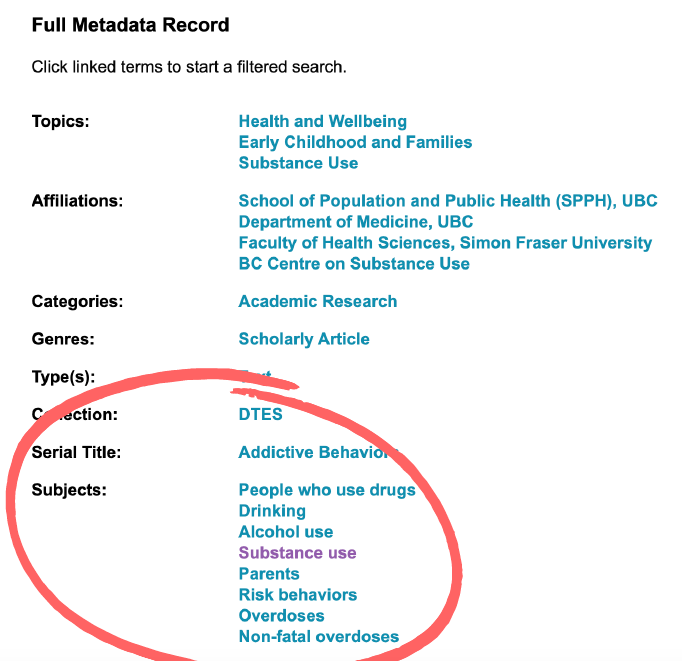Sarah Nocente
Graduate Academic Assistant with STOREE and the Making Research Accessible Initiative
BC is in a public health emergency. Since 2016, over 10,000 lives have been lost to a toxic drug supply. This staggering number demonstrates the urgency for harm reduction strategies, such as decriminalization. When it comes to decriminalizing people who use drugs, BC’s Provincial Health Office Dr. Bonnie Henry explains, “stigma matters because it undermines the response to the overdose crisis in BC at every turn.” Stigma impacts access to basic health and social needs, but also “influences public support for evidence-based strategies that save lives and links people to treatment,” according to Henry’s 2019 report.
How we talk about substance use has serious social and health impacts. Moving away from deficit focused language can change perceptions of substance use away from a moral, social, or criminal issue to a medical issue. This is one of the reasons STOREE and the Making Research Accessible Initiative (MRAi) have been thinking about how we describe materials that appear in research collections, namely the Downtown Eastside Research Access Portal (DTES RAP). The DTES RAP recently published a statement on harmful, problematic, and contested language to acknowledge that terms used to describe research constituents and topics are often out of date, biased, inaccurate, and stigmatizing to the people who search, and are represented in, the DTES RAP.
As a research assistant with the STOREE project, I have been building a thesaurus for the Downtown Eastside Research Access Portal. My primary focus has been on the areas of substance use and health, which are topics that make up over a third of the materials in DTES RAP. For many the word “thesaurus” evokes a dictionary of synonyms. In the library world, a thesaurus is a structured set of predefined terms used to describe resources.
A thesaurus can help you find what you are looking for by using consistent and accurate terms to describe online content. You can think of these terms as giving you a snapshot of what a resource is about.
Why Build a Thesaurus?
There are many benefits to creating a community-centered thesaurus, like the one we are building for the DTES RAP. For one, it provides control over how concepts are referred to. Rather than having a series of synonyms that refer to the same thing, a thesaurus establishes a single preferred term that describes resources about that concept. By providing consistent language, users can be confident that searching for a key term in a database will bring up all relevant content represented by that term.
Another benefit is that creating a thesaurus provides intentionality in descriptive language. While this also improves users’ abilities to search and retrieve relevant content, it also opens an opportunity for preferred terms that are in tune with community perspectives and needs. Once the thesaurus is complete, items in the DTES RAP could be indexed using community-preferred terms; for example, using the phrase “people who use drugs” rather than “drug addicts.” This acts as a tool to promote respectful and accurate language about the Downtown Eastside.
Using Equitable Language
Creating a place-based thesaurus for the DTES RAP is an iterative process that involves consultation, testing, and revision. Resources such as the Research Recovery Institute’s Addictionary and BC Centre on Substance Use’s Language Matters provide guidance about using inclusive, non-stigmatizing language. However, it is important to note that these resources offer recommendations and require some modifications to reflect the local language of the Downtown Eastside community. While it is not always possible to come to a consensus for every term, the DTES RAP adopts an equitable approach to language. This means using strategies like:
- Using person-centered language (e.g., “person living with HIV”) rather than “HIV infected”)
- Avoiding pejorative terms and idioms (e.g., “negative toxicology test” rather than the idiomatic term “clean”)
- Using accurate language about the medical nature of substance use disorders (e.g., “Opioid Agonist Treatment” instead of “drug or opium substitution”)
- Using language that promotes harm reduction (e.g., “withdrawal management” instead of “detox”)
These language practices help to intervene in discriminatory, stereotyped, or prejudiced representations of the Downtown Eastside. By implementing equitable language strategies, we are working to ensure that the items in the DTES RAP are described in a respectful and socially relevant way to the Downtown Eastside community.
Goals of the Project
Our goals for developing a community-centered thesaurus are to:
- Provide more equitable access to academic research about the DTES; and
- Affirm the voices and perspectives of the DTES community by appropriately describing materials created by DTES residents and organizations.
The thesaurus will need ongoing revisions and updates in response to changing language preferences in the DTES community. Future plans for the project will focus on ensuring the sustainability of the DTES RAP thesaurus, especially considering the substantial resources and stakeholder coordination required to keep it up to date. In pursuing the above goals, the thesaurus encourages users of the DTES RAP to think critically about the language they use and to reflect on its social impact.
